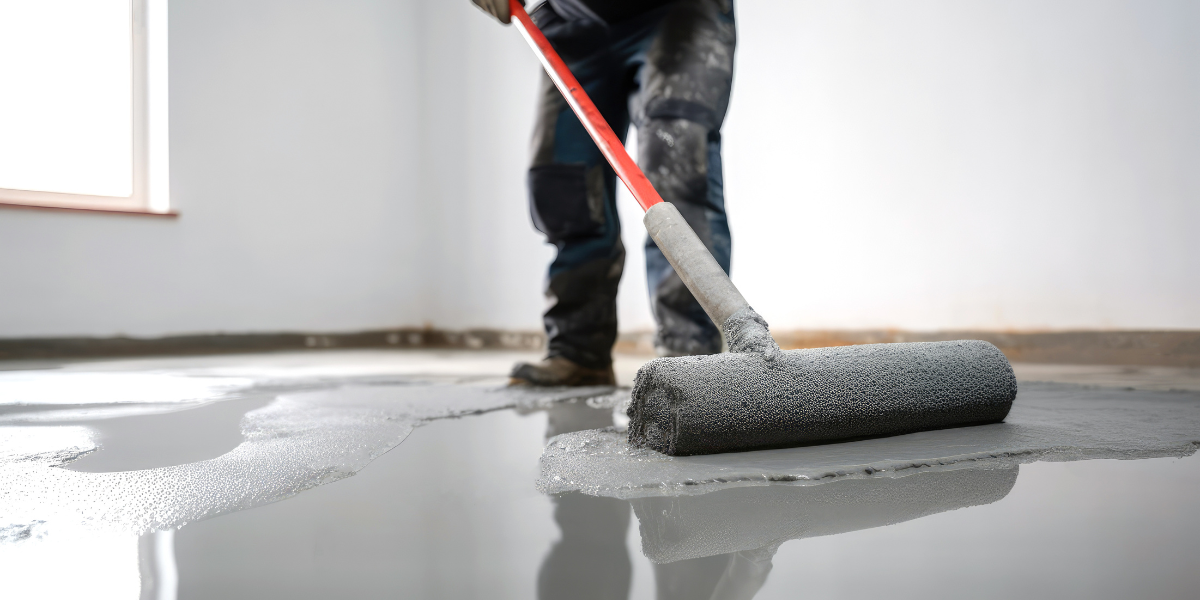Self-leveling mortar is an important construction material, used increasingly popularly in many modern construction projects. With the ability to flow and level by itself, this type of mortar helps create flat, smooth floor surfaces, ready for the next construction stages. In this article, we will learn about self-leveling mortar, from the concept, advantages and disadvantages to how to use and specific applications of this product.
1. What is Self-Leveling Mortar?
Self-leveling mortar is a type of mortar whose main ingredient is cement combined with polymer and special additives, creating the ability to flow and level the surface without the need for manual tools such as trowels. This product is often used to level concrete floors before applying other finishing layers such as wooden floors, plastic floors, or tiles.
With good self-flowing properties, self-leveling mortar helps ensure perfect flatness and uniformity for the floor surface, minimize technical errors during floor construction and enhance abrasion resistance and water resistance.
2. Advantages and Disadvantages of Self-Leveling Mortar
Advantages
High adhesion: Self-leveling mortar has the ability to adhere firmly to the concrete floor surface, ensuring no peeling or cracking of the surface.
Fast hardening speed: After construction, the mortar can harden and be used after about 24 hours, helping to save construction time.
Self-leveling and smoothing: With self-flowing properties, the mortar easily levels uneven surfaces, creating high smoothness without much manual intervention.
Waterproofing and abrasion resistance: The mortar has good waterproofing ability, suitable for use in projects that require durability and resistance to environmental factors.
High compressive strength: The product has good mechanical strength, withstands large compressive and bending forces.
Environmentally friendly: The product does not contain toxic ingredients, safe for construction workers and users.
Reasonable price: Self-leveling mortar is affordable, suitable for many customers.
Disadvantages
High mixing technical requirements: To achieve the best results, mixing mortar must comply with the correct ingredient ratio. For new users, this may be difficult.
Depending on weather conditions: Mortar needs ideal construction and dry conditions to ensure the best quality.
3. How to Use Self-Leveling Mortar Effectively
To achieve optimal efficiency when using self-leveling mortar, users need to pay attention to the following steps:
Surface preparation: Before construction, the floor surface must be completely clean, free of dust, grease or other impurities that can affect the adhesion of the mortar.
Mortar mixing: Mortar must be mixed in the exact ratio according to the manufacturer's instructions. You can use a mixer or mix by hand, ensuring that the mortar has the right consistency.
Mortar construction: The mortar is poured directly onto the surface and will flow and level by itself. If necessary, you can use a roller to spread the mortar evenly to achieve absolute flatness.
Wait for it to dry: The mortar will dry and harden after about 24 hours, then you can continue with other finishing steps.
4. Applications of Self-Leveling Mortar
Self-leveling mortar is widely used in construction works from civil to industrial. The main applications include:
Leveling the floor before tiling, wooden floors, or carpeting.
Used for works that require waterproofing and abrasion resistance such as factories, hospitals, or wet areas.
As a floor lining before installing underfloor heating systems.
In Vietnam, some units such as Hoang Ha IBT Group are providing high-quality self-leveling mortar lines, which are strictly tested and fully meet technical standards. Hoang Ha's products not only help create a flat, smooth floor surface but also ensure long-term sustainability for the project. Self-leveling mortar is an effective solution for leveling the floor surface before applying other finishing layers. With many outstanding advantages such as good adhesion, waterproofing, and high strength, self-leveling mortar helps save time and construction costs. Hoang Ha's products are also one of the top choices for contractors, ensuring quality and durability in projects. However, to ensure the best quality, users need to pay attention to mixing and suitable construction conditions, ensuring optimal mortar usage efficiency.


